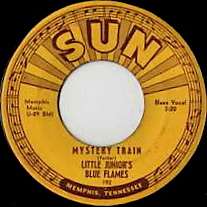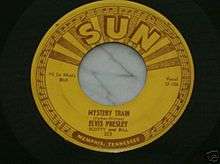Mystery Train
"Mystery Train" is a song written and recorded by American blues musician Junior Parker in 1953. Originally performed in the style of a Memphis blues or rhythm and blues tune, it was inspired by earlier songs and later became a popular rockabilly song, as first covered by Elvis Presley, then numerous others.[2]
| "Mystery Train" | |
|---|---|
 | |
| Single by Little Junior's Blue Flames | |
| B-side | "Love My Baby" |
| Released | November 1953 |
| Recorded | September–October 1953 |
| Studio | Memphis Recording Service, Memphis, Tennessee |
| Genre | |
| Length | 2:20 |
| Label | Sun |
| Songwriter(s) | Junior Parker |
| Producer(s) | Sam Phillips |
Composition and recording
Music historian Colin Escott noted "One of the mysteries about 'Mystery Train' was where the title came from; it was mentioned nowhere in the song".[3] The song uses lyrics similar to those found in the traditional American folk music group Carter Family's "Worried Man Blues", itself based on an old Celtic ballad,[2] and their biggest selling record of 1930:[4]
The train arrived sixteen coaches long
The train arrived sixteen coaches long
The girl I love is on that train and gone
Parker's lyrics include:
Train I ride sixteen coaches long
Train I ride sixteen coaches long
Well, that long black train carries my baby home[5]
Junior Parker, billed as "Little Junior's Blue Flames", recorded "Mystery Train" for producer/Sun Records owner Sam Phillips.[6] The sessions took place at Phillips' Memphis Recording Service, in Memphis, Tennessee, during September and October 1953. Accompanying Parker on vocal is his backup band the "Blue Flames", whose members at the time are believed to have included: Floyd Murphy on guitar,[7] William Johnson on piano, Kenneth Banks on bass, John Bowers on drums, and Raymond Hill on tenor sax.[3]
"Mystery Train" was the follow-up single to Junior Parker's 1953 number five Billboard R&B chart release "Feelin' Good".[8] The song did not reach the singles chart.
Elvis Presley version
| "Mystery Train" | |
|---|---|
 | |
| Single by Elvis Presley | |
| A-side | "I Forgot to Remember to Forget" |
| Released | August 20, 1955 |
| Recorded | July 11, 1955 |
| Studio | Memphis Recording Service, Memphis, Tennessee |
| Genre | Rockabilly[5] |
| Length | 2:29 |
| Label | Sun |
| Songwriter(s) | |
| Producer(s) | Sam Phillips |
Elvis Presley's version of "Mystery Train"[5] was first released on August 20, 1955, as the B-side of "I Forgot to Remember to Forget".[10] In 2003, Rolling Stone magazine ranked it at number 77 on its list of the 500 Greatest Songs of All Time.[11] Sam Phillips at Sun Studios again produced the recording, and featured Presley on vocals and rhythm guitar, Scotty Moore on lead guitar, and Bill Black on bass. Moore used a country lead break. Scotty also added a touch of the slapback echo, and used travis picking.[12] and toward the end of the record is an echo of the 1946 "Sixteen Tons" by Merle Travis.[13] For Presley's version of "Mystery Train", Scotty Moore also borrowed the guitar riff from Junior Parker's "Love My Baby" (1953),[14] played by Pat Hare.[15]
Paired with "I Forgot to Remember to Forget", the single reached the Top 10 in Billboard's C&W listings.[16]
RCA Victor rereleased this recording in November 1955 (#47-6357) after acquiring it as part of a contract with Presley.[17] This issue of the song peaked at number 11 on the national Billboard Country Chart.[18] That same month, RCA Victor also released a pop version of the song by the Turtles (not to be confused with the 1960s pop group, the Turtles) with backing by Hugo Winterhalter and his Orchestra (47-6356).
"Mystery Train" is now considered to be an "enduring classic".[19] It was the first recording to make Elvis Presley a nationally known country music star.[18][20] Black, who had success with the Bill Black Combo, once said to a visitor to his house in Memphis, as he pointed to a framed 78rpm Sun Record of "Mystery Train" on the wall, "Now there was a record."[21] Presley's version was ranked the third most acclaimed song of 1955, by Acclaimed Music.[22] It also appeared in Jim Jarmusch's 1989 independent film Mystery Train.
Personnel
- Elvis Presley – lead vocals, acoustic rhythm guitar
- Scotty Moore – electric lead guitar
- Bill Black – double bass
The Band version
In 1973, with the approval of Sam Phillips, Robbie Robertson of the Band wrote additional lyrics for "Mystery Train", and the group recorded this version of the song for their Moondog Matinee album. They later performed the song with Paul Butterfield for their 1976 "farewell" concert The Last Waltz.[23]
Book
In 1975, rock author Greil Marcus published his widely lauded [24][25][26] book Mystery Train: Images of America in Rock 'n' Roll Music,[27] inspired by the Elvis Presley recording of the Junior Parker song.[25]
References
- Bill Dahl. "Junior Parker | Biography & History". AllMusic. Retrieved 2016-07-25.
- Herzhaft, Gerard (1992). "Mystery Train". Encyclopedia of the Blues. Fayetteville, Arkansas: University of Arkansas Press. p. 463. ISBN 1-55728-252-8.CS1 maint: ref=harv (link)
- Escott, Colin (1990). Mystery Train (Album notes). Junior Parker, James Cotton, Pat Hare. Cambridge, Massachusetts: Rounder Records. pp. 1–2. CD SS 38.CS1 maint: ref=harv (link)
- "American Experience | The Carter Family: Will the Circle Be Unbroken". Pbs.org. Retrieved November 29, 2010.
- Gilliland, John (1969). "Show 8 - The All American Boy: Enter Elvis and the rock-a-billies. [Part 2]" (audio). Pop Chronicles. University of North Texas Libraries.
- Robert Palmer. Deep Blues. Penguin Books. p. 237. ISBN 978-0-14-006223-6.
- Floyd Murphy is a brother of Matt "Guitar" Murphy.Herzhaft, Gerard (1992). Encyclopedia of the Blues. Fayetteville, Arkansas: University of Arkansas Press. p. 197. ISBN 1-55728-252-8 https://archive.org/details/encyclopediaofbl00herzh/page/197. Missing or empty
|title=(help)CS1 maint: ref=harv (link) - Sun Records number 187
- Burke, Ken and Dan Griffin. The Blue Moon Boys - The Story of Elvis Presley's Band. Chicago Review Press, 2006. pg. 48. ISBN 1-55652-614-8
- Sun Records number 223
- "Search Articles, Artists, Reviews, Videos, Music and Movies". Rolling Stone. Retrieved 2010-11-29.
- Blue Moon Boys. page 48
- Tosches, Nick. Country - the Twisted Roots of Rock 'n' Roll. DeCapo Press, 1985. pg 54. ISBN 0-306-80713-0
- "Archived copy". Archived from the original on 2006-06-14. Retrieved 2012-07-03.CS1 maint: archived copy as title (link)
- Gillett, Charlie (1984). The sound of the city: the rise of rock and roll (Rev. ed.). New York: Pantheon Books. ISBN 0-394-72638-3. Retrieved 6 July 2012.
"Love My Baby" in particular featured some blistering guitar playing by Pat Hare, which inspired the rockabilly style discussed elsewhere.
- Billboard, December 17, 1955. Reviews of New Pop Records. pp.56 and 61.
- "Archived copy". Archived from the original on 2012-07-22. Retrieved 2012-07-22.CS1 maint: archived copy as title (link)
- "Archived copy". Archived from the original on 2007-09-02. Retrieved 2015-08-17.CS1 maint: archived copy as title (link)
- Burke, Ken and Griffin, Dan. The Blue Moon Boys - The Story of Elvis Presley's Band. Chicago Review Press, 2006, p.46. ISBN 1-55652-614-8
- Collins, Ace (1996). The Stories Behind Country Music's All-time Greatest: 100 Songs. New York: The Berkeley Publishing Group. pp. 94–96. ISBN 1-57297-072-3.
- Burke, Ken and Griffin, Dan. The Blue Moon Boys - The Story of Elvis Presley's Band. Chicago Review Press, 2006, p.152.
- "Acclaimed Music Top 3000 songs". Acclaimed Music. 27 May 2009.
- Moondog Matinee (1973) liner notes
- "Greil Marcus: a life in writing" by Simon Reynolds, The Guardian, 17 February 2012
- "Just a Book? No, More Like a Trusty Companion" by Dwight Garner, The New York Times, September 2, 2015
- "A Conversation With Greil Marcus: 'Mystery Train' Keeps Rolling at 40" by Rob Sheffield, Rolling Stone, October 19, 2015
- Marcus, Greil. Mystery Train: Images of America in Rock 'n' Roll Music; Plume; 5th edition: March 25, 2008; ISBN 978-0452289185